InMedia Partners
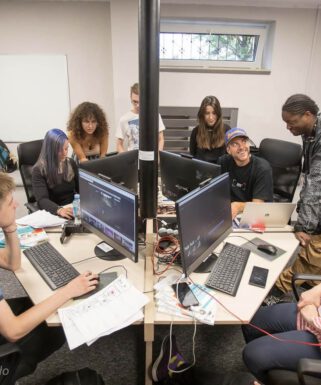
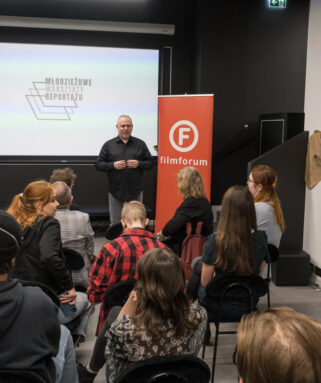
FILMFORUM (Poland)
Who We Are
Best of what the film industry has to offer – great movies, best actors, directors and producers, amazing atmosphere, and numerous film education programmes. That is exactly what FILMFORUM is all about. The mission of the organization is to connect experienced filmakers with their younger colleagues and fans – all free of charge. Main goals of the organization are the popularization of short films in Poland and abroad, as well as the promotion of young independent filmmakers and opening the way to the world of film for young people who dream of starting a career in the industry.
Target Groups
The association’s activities are directed mainly at young people and are based on promoted by EU peer education methods, in which participants of numerous programs educate and develop the talents of their less experienced colleagues. FILMFORUM’s mission is to enable young people from small towns and with limited financial resources to start operating in the film industry, for whom it would otherwise be much more difficult and very expensive.
Best Practice
Every year FILMFORUM Association helds 3 international film festivals – KAMERALNE LATO in Radom, WAMA Film Festival in Olsztyn and CINEMAFORUM in Warsaw. It is a great chance for the young filmmakers not only to encounter with their more experienced colleagues but also to take part in professional workshops during which they are able to create their own short films. For almost a decade FILMFORUM has also organized series of film workshops –Youth Documentary Workshops and MASTERCLASS – School of Filmmaking.
Staff & Equipment
FILMFORUM is a group of passionates who act for promotion of audiovisual culture through outstanding film events – film festivals, reviews, meetings with filmmakers. There are 5 full time workers at the office and dozens of professionals from the film industry working every year during the events and workshops. Every activities engage also many filmmakers and artists. FILMFORUM is also organizing an internships for young people who wants to start their career in the industry. During the workshops young participants are able to create their first short movies with full and professional equipment which is provided by the FILMFORUM.
Methods
The organisation’s goals are focused around issues like social inclusion,intercultural tolerance, entrepreneurial activation (in particular in the scopeof involving young people in innovative activities in creative sectors),developing the skills of conscious use of cultural resources. FILMFORUM ishosting 10 workshop cycles for almost 400 people yearly on various levels and organises ventures for young film industry for over 15 000 people – film contests, awards for filmmakers and networking meetings for representatives of individual film professions.
Contact
FILMFORUM Association
ul. gen. Władysława Andersa 35
00-159 Warsaw, Poland
e-mail: stowarzyszenie@filmforum.pl
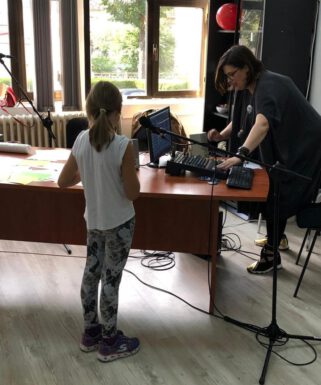
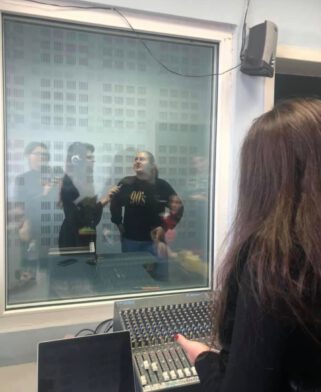
Lucian Blaga University of Sibiu (Romania)
Who We Are
“Lucian Blaga” University of Sibiu (ULBS) is an academic institution with international openness, based on democratic values, university autonomy, and respect for human rights, a mission set out in the charter of our university. Our slogan „A thousand identities, one University!“ expresses the respect for diversity and the inclusive environment that ULBS offers to students and teachers. Also, student-centered education is our defining quality standard in teaching activities, which requires a proactive approach in relation to students and their needs.
Methods
The specializations of Journalism and Public Relations are part of the Faculty of Social Sciences and Humanities and promote freedom of expression, media professionalism, ethical principles, and universal social values, such as goodness, truth, honesty, transparency, and public interest. Our vision is connected to the problems of the global world, which is why inclusive education has become a priority for us in recent years.
Targets
The Journalism Specialization offers students courses that include topics related to the inclusion of vulnerable groups, anti-racist education, non-discrimination, gender equality, etc. Students are taught how to document, contextualize, and frame controversial or sensitive topics for certain social groups such as people with autism, marginalized children, people with disabilities, etc. Click here for just a few examples from our work: here, here, and here.
Throughout the courses in the radio and TV laboratories, as well as during internship stages, we insist on storytelling techniques, practices in media production and also on how to report on marginalized communities, how to properly address and interact with vulnerable communities, how to be proactive in identifying ways in which news reporting can be truly inclusive.
ULBS promotes inclusive education and allows students of all backgrounds to learn and interact side by side, offering them equal learning opportunities in a supportive academic environment that can greatly improve the learning experience of our students, and ensure harmonious interactions in a diverse society (building accessibility, digital bibliographic units, alternative, accessible formats, easy-reader programs.)
Contact
Lucian Blaga University of Sibiu
Victoriei Bd., No.10, Sibiu, 550024, Romania
Phone +40-(269) 21.81.65, +40-(269) 21.29.70
Website: ulbsibiu.ro/en/
Facebook: facebook.com/ULBSibiu
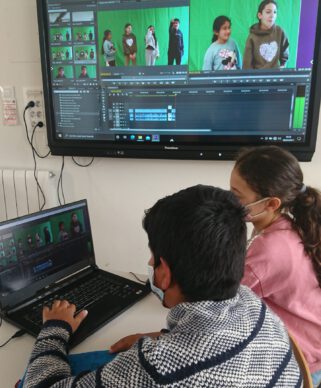
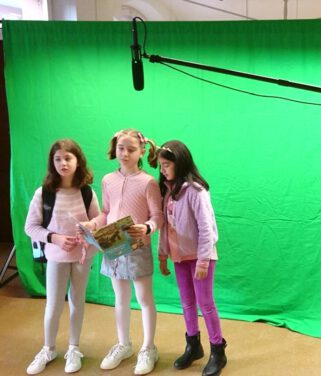
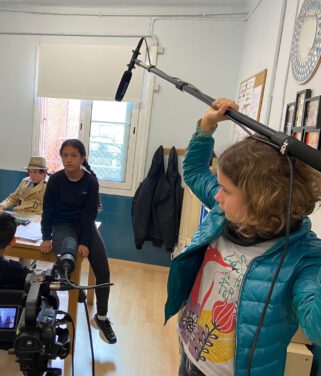
Who We Are
Our line of action is on the intersection between education and communication. We aim to provide opportunities for self-expression and self-representation to face the power of mass-media and cultural industries. We walk on the basis of action research and we are guided by learning by doing strategy, investigating cooperative and collaborative work methodologies. We do it through participatory and collaborative audiovisual creation processes towards to social inclusion. During the past 25 years, Teleduca. Educació i Comunicació SCP has developed a common space of practical work and action research to create an integral project on media literacy (educommunication), using participatory methodologies for audiovisual creation, having the community in the center with an inter-sectional prospective.
Target Groups
Our central points of interest are thechildren, teenagers, young people, women, migrants and other social collectives without equal opportunities. We strongly believe that social inclusion could be addressed through audiovisual expression, dialogue, feed-forward, (individual and collective) empowerment and conviviality.
Best Practice
Escoleta de Cinema (Cinema School for the Little Ones)
includes different projects in which participatory audiovisuals are at the service of children and young people so that they can create and make audiovisual pieces from their own point of view. The whole creative process is carried out from a critical perspective and in relation to the community.
Vídeo-memòries i recerca de l’entorn (Video Memories and Context Research)
creates an opportune space so young people can research about their closest environment rescuing the historical memory of their own neighbourhood by creating short videos from their own interpretation.
Nosaltres creem (We believe, We create)
is based on the concept of service-learning that brings the opportunity for the young people to make their own short-movies about gender where they can pointing out the inequalities they live in from their own prospective.
MoPA (Short Movies Festival)
is directed and designed for primary school students where they have the chance of creating their first short-movie from a cross-cutting theme chosen annually that brings about their own imaginary.
Within CreAr-tE Badalona
we use audiovisual as an empowerment tool for kids with the aim of themselves to be able to talk about their own neighbourhood, their own realities and get to know their territory better.
Staff & Equipment
Teleduca. Educació i Comunicació SCP is carried out by 4 full-time and 8 part-time interdisciplinary professionals that works along the different projects we have. We also like to have other young people involve as volunteers or interns.
Methods
Per year, we develop more than 100-120 audiovisual productions made by participatory methodologies and following our principles on media literacy (educommunication).
It means we are facilitating learn by doing processes with more than 1.000 people.
As we said, one of our main strategies is learn by doing audiovisual making process to promote collaboration and cooperation within small teams focusing on the interests and the proposals of the participants.
We also implement the feed-forward strategy providing the participants prior exposure and prior practice in order to clarify expectations which brings about collective stories from the first individual approaches. For this, we develop shooting and editing participatory sessions with small and middle size groups that helps to generate a links with everyday life environment, using dialogue as a tool for interaction between diverse social groups and encourage understanding within the community and a good conviviality.
Contact
C/Nació, 51 local
08026 Barcelona
Tel. +34934509826
E-Mail: teleduca@teleduca.org
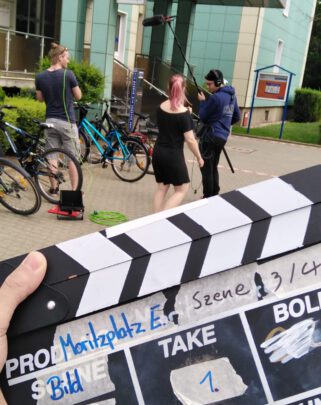
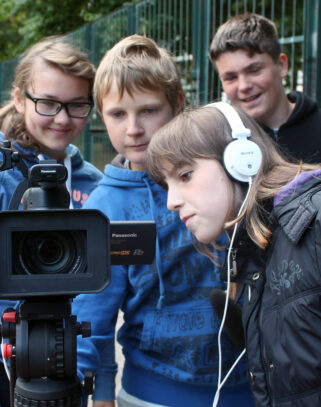
Offener Kanal Magdeburg (Germany)
Who We Are
Offener Kanal (german for ‘Open Channel‘) is a local TV-station, situated in Magdeburg. The programm is being created by the people of Magdeburg. In Offener Kanal, everybody can work on shows by themselves. We give the public free access to everything they need for a TV production: Cameras, light/sound equipment and editing spaces.
Target Groups
Offener Kanal Magdeburg is open to anybody, who wants to create films and television in Magdeburg. It doesn‘t matter if they are young or old, individuals or in groups, clubs, pressure groups, students, universities or newcomer filmmakers and journalists. The Offener Kanal is open to everyone, who enjoys creating film and television projects. Everybody works together to keep the Offener Kanal alive and to make it a TV-station, that creates content from and about Magdeburg, as well as for Magdeburg.For groups and people, who struggle to find their own way into theOffener Kanal, we offer, together with our partner institutions, specialrecruitment projects in the city. Those projects especially target senior citizens, people with disabilities, children, people with a history of displacement and forced migration and women, who unfortunately create content too rarely in the Offener Kanal.
Best Practice
Offener Kanal has worked on a lot of great projects with very diverse socialgroups. Our current highlight is ‘Magdeburg Moritzplatz‘. Young people with and without a backround of displacement work together on a TV-series about living and growing together. They do most of the work bythemselves, such as writing the script, acting and filming. Season 1, containing 4 episodes, has already been filmed. In April 2021 the filming of season 2 started.
Staff & Equipment
The Offener Kanal has numerous cameras, editing spaces and a 50 square meter wide TV-Studio for discussions, shows and live music. It is a space to realize all kinds of ideas. In Offener Kanal, there are four part time workers and a lot of national and international volunteers. They, on average, stay for one year and their tasks include supporting Offener Kanal users, helping with recordings in the studio and the city, as well as realizing their own projects. The major part of our work is being paid by the so called broadcasting fee. That is a national fee which every household inGermany has to pay to maintain public broadcasting services. For all the projects, in which we focus on vulnerable groups, we have to file application for additional funding. This funding originates from public resources, as well as from private foundations and funds from the European Union.
Methods
We work along the method of ‘active media work‘. Our approach is the following: The individual ,as an acting subject, is learning in a practical manner to use media for the articulation of it‘s own interests and needs. This process is not only about the delivery of technics but also about personal development and participation. The aim of this process is always the support of emancipation, which describes the self-determination of the individual.
Contact
Offener Kanal Magdeburg e.V.
Olvenstedter Strasse 10
39108 Magdeburg
Fon: 0391-7391327
Mail: info@ok-magdeburg.de
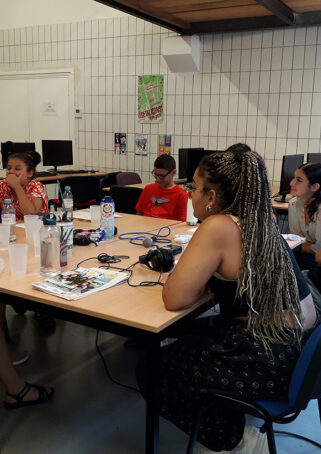
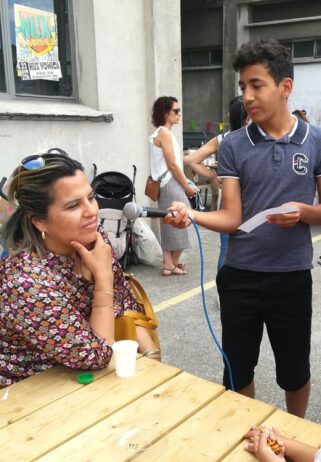
Who We Are
The National Federation of Participatory Audiovisual, formerly known as the Federation of Videos from Countrysides and Neighborhoods, is a national association of popular education which works for the appropriation of media and information by the citizens. The Federation gathers nearly 40 associations and local cooperatives of production, local television stations distributed throughout the national territory. They are found in both rural and urban areas. They are non-profit organizations and are part of the solidarity economy. They are based on a hybrid economic model, using self-production, public and private funding, and as well as volunteering.
Who We Work For
- Media, image, information and digital tools literacy, with a particular attention to the needs and expectations of the various actors who request them or participate in their actions. This commitment leads them to implement projects with various form, duration, themes, objectives, etc.
- Free expressionemanating from a territory in order to facilitate citizen mobilization, theexpression of demands, the affirmation of identities in their diversity,exchanges between inhabitants or with institutional partners.
- Valorization of local dynamics that contribute to set society in motion (association, solidarity, innovative projects) through documentary films, thematic audiovisual programs, fiction films, local information, talk shows, television,etc.
- The development of social link through participatory audiovisual projects.
- Support for audiovisual self-production.
Our Main Activities
- Training in participatory audiovisual practices and associative structuring, as a professional training organization since 1996, with Qualiopi approval. It offers catalog of training courses, and since 2021 a new training as “Media and information educator” has been worked on.
- Field expertise, support for experiments and studies.
- International cooperation with a European network since 2002.
- Production and distribution of audiovisual creations, in particular with the creation of a Federation’s Peertube: https://video.audiovisuel-participatif.org/
- To share and enhance practices through fellowship, in particular through the European Media Fellow project launched in 2017 :https://www.audiovisuel-participatif.org/media-fellow-3/
Contact & Links
Registered office: Uhaldea – 6 route del’église au pont Noblia – 64 780 Bidarray
Contact: Anne Breuzin and Thomas Desset
Phone: +33 6 33 04 44 84
Website: audiovisuel-participatif.org/
Mail: audiovisuel.participatif@gmail.com
Peertube: video.audiovisuel-participatif.org/
Facebook: facebook.com/audiovisuelparticipatif
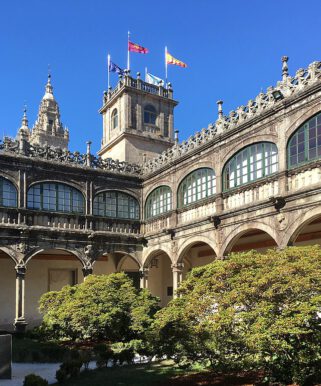
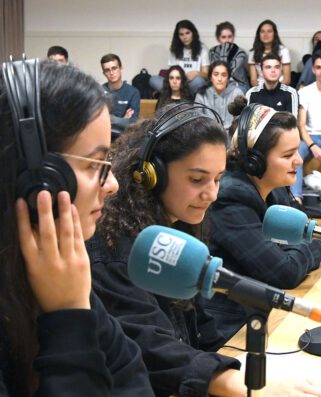
Who We Are
The University of Santiago de Compostela (USC) is a public
higher education entity that has a wide academic offer and powerful research
activity, in connection with the demands and challenges of society. It has been
valued for its excellence as one of the best universities in Spain and in the
European Higher Education Area for its dedication and responsibility in
developing entrepreneurship politics and promoting the transfer and
appreciation of scientific knowledge.
Target Groups
USC has 4 main lines of action: education, research, management and social commitment.
It has more than 30,000 people, of which 25,000 are students and more than 3,000 researchers. Specialized in the generation and transfer of knowledge, it works in consortium with all agents and at the service of society.
Best Practice
The transdisciplinary team that represents USC in the InMedia project has worked on
dialogue and participation with different social groups at risk of exclusion, providing pedagogical support, suppling planning and analysis of action protocols and procedures or training in media and participatory audiovisual with an inclusive orientation, focusing on people with disabilities, children and youth in environments of affective or labor precariousness, women at risk, migration or minorities; establishing frameworks based on human rights, intercultural dialogue or generating proven materials to make visible and
activate the interpersonal and community communication of these people and groups. Some of the representative experiences is the creation of critical reading circles on the media (CIDEC project); the training experiences about journalism and participatory audiovisual through
the Citizen Observatory of Communication; or the creation of inclusive film routes (Volunteers in the Audiovisual project. In addition, the Terceira Xeración Research Group (TeXe) specializes in Education for Development and Global Citizenship with a permanent collaboration with Non-Governmental Development Organizations (NGDO).
Staff & Equipment
The USC has a community of more than 30,000 people between students and teaching, research and administrative staff. It has two campuses, one in the city of Lugo and the other, the largest, in Santiago de Compostela. The Faculty of Communication Sciences has more than
700 students and almost 90 teachers and researchers. It has sets, studios, laboratories and specialized equipment. The Faculty of Education Sciences, located in Santiago de Compostela, has more than 2000 students and more than 200 teachers and researchers.
In addition, the USC has a communications office that facilitates the dissemination and projection of the institution.
Methods
The USC has developed in its projects with social intermediaries and groups at risk of
exclusion interaction procedures and tools of understanding and narrative construction so that these people and groups can share their proposals and needs with other interlocutors and community agents. So that they revalue their potential as individuals or a group in the face of exclusionary discourses or the invisibility to which the conventional comunication media often relegates them.
In the field of educational processes, the USC working group participating in InMedia
is specialized in formal, non-formal and informal processes that ensure
participation and equal opportunities.